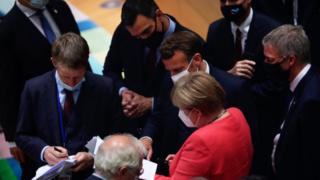 Image copyright
AFP
Image caption
The agreement followed several days of negotiations
Image copyright
AFP
Image caption
The agreement followed several days of negotiations
EU leaders have struck a deal on a huge post-coronavirus recovery package following a fourth night of talks.
It will see the 27-nation bloc offering €750bn (£677bn; $859bn) in grants and loans to counter the economic impact of the pandemic.
French President Emmanuel Macron said it was a "historic day".
Talks which began on Friday saw a split between nations hardest hit by the outbreak and "frugal" members who were concerned about costs.
Indications earlier suggested that the deal would centre on a €390bn programme of grants to member states hardest hit by the pandemic.
The negotiations marked the first face-to-face meeting between the leaders since governments began imposing lockdowns in March in a bid to stop the spread of the virus.
They started in Brussels on Friday morning and became the longest EU summit since a 2000 meeting in the French city of Nice, which lasted for five days.
How did we get here?
The agreement followed days of talks between EU countries in which tempers were often frayed.
Member states were largely split between those hit hardest by the outbreak and keen to revive their economies, and those more concerned about the costs of the recovery plan.
The self-proclaimed frugal four - Sweden, Denmark, Austria and the Netherlands - along with Finland, had opposed allowing €500bn to be offered in the form of grants to countries hardest-hit by Covid-19. The group, led by Dutch Prime Minister Mark Rutte, originally set €375bn as the limit, in addition to wanting conditions such as the right to block requests.
Other members, such as Spain and Italy, did not want to go below €400bn.
At one point French President Emmanuel Macron reportedly banged his fists on the table, as he told the "frugal four" he thought they were putting the European project in danger.
The €390bn figure was suggested as a compromise.
Details of the deal have not yet been made public.

 5 years ago
535
5 years ago
535 

